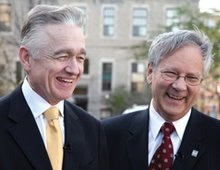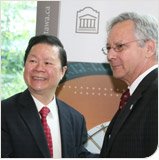
This is a follow up to a previous post about a historic development at the Senate of the University of Ottawa: LINK.
The Senate of the University of Ottawa is the highest governing body on all academic matters in the institution, pursuant to the University of Ottawa Act, 1965.
In law, the Senate instructs executive management on all academic matters.
The Senate is intended to work as a democratic body, at the top of the collegial governance apparatus, where senators as equals authentically engage and make collective decisions.
Instead, the Senate at the University of Ottawa has become a showcase where the university executive managers decide on the agenda, veto motions before they can be considered, decide when discussions should end, write the minutes, and even declare when a "consensus" has been reached in the face of repeatedly voiced opposition (see video of January 10, 2011, meeting).
Fortunately Senate sessions are now filmed and made public (thanks to student activism) such that astute observers can ascertain what a sham it has become. Where are our brave tenured colleagues who work in the areas of institutional analysis, democracy studies, ... ?
In an effort to partly correct the administrative hijacking of Senate, some student senators had advanced that rules of procedure were needed that guaranteed democratic procedures, such as the iconic Robert's Rules of procedure. (LINK)
The embarrassment that no rules of procedure existed for Senate was enough that the student proposal could not be ignored, although this was the executives' main initial recommendation. (LINK)
Therefore, the executive management of "Canada's university" needed to solve the impending crisis of democracy whereby rules of procedure might create some room for democratic process.
The executives' solution was twofold:
(1) Provide interim rules which conveniently fit on one page, which leave out all the fluff about the democratic rights of senators, and which are a point-form list of the Chair's (which at U of O is the University President) functional role in ending discussions, calling the vote, declaring "consensus", etc.; without any mention of how motions are added to the agenda, for example.
(2) Do not create a Senate committee to study the question of procedural rules for six months, until after the mandates of the pesky students who brought this up are over.
The second arm of this solution is clever and was needed after the executives' first attempt -- which was to have the executive managers name the members to the new Senate committee -- was exposed as a device to exclude the student who had spearheaded the rules issue.
After missing two Senate meetings, you can tell that President Allan Rock is back, just in time to solve this crisis in democracy; although VP-Governance Diane Davidson was well on her way to achieving a solution.
Note that both Allan Rock and Diana Davidson are outside executives, not named from the professorial ranks.
Senators: Stand up, your noses are brown.




No comments:
Post a Comment